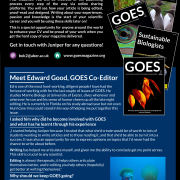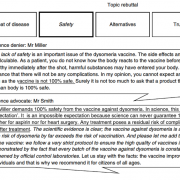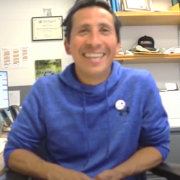Alternate careers after PhD
Part of the “Self Reflection” series by and for early-career researchers
These chapter of the “Self-reflection Series” was conceived to provide an insight for early-career scientist into options after defending their PhD dissertation, especially because many natural science degrees are (almost) exclusively academia oriented.
When I first began in the university for my Biochemistry degree it was the year 2000, I was 18, and I could only picture myself working in a lab, no other option come to mind. And the only way to be able to work on a lab and make a career was to achieve a PhD degree. During my student years I heard about careers outside academia, however in order to have a chance for them it was advisable not to have a PhD. This was half urban legend, however it put the idea into my head that PhD AND career outside university was incompatible. Luckily, in my 5th year of undergraduate studies, during my Erasmus exchange year in Germany, I finally got to know people that left academia after finishing their PhD to pursue a successful and science-related career. So, I decided to go into the PhD adventure, however much calmer knowing that I really hadn’t closed any doors behind me. And probably surprisingly to my 18 year self, 13 years later I decided to pursue a life outside the lab. In order to do that I decided to undergo some innovation and business oriented training and move for 6 months to Belgium. It took some time and effort but it was worth it.

So, I decided to perform (yet again) a survey to learn how and when others decided to pursue a job outside academia after their PhD. For this topic, I gathered 48 responses thanks to Plantae, the PCST network and the Spanish Association of Science Communicators (AECC). Respondents were around 39 years of age and work predominantly on science communication (35%), but also R&D management (10%), research outside academia (8%), teaching (8%), patent examiners (4%) or are entrepreneurs (4%). Some minor options emerged also, such as quality manager or even musician (!?). As expected, a lot of people answering are now in the business of science communication, quite a broad topic that includes many different and interesting occupations such as journal editor, science writer, science museum/center and exhibition planner or scientific event’s organizer. A lot to choose from.
I was very interested in learning when they first thought of a possible job outside academia, especially because I had such a hard time figuring out the possibility. Indeed, few had a very clear idea of pursuing an alternate career (17%) after PhD before entering the PhD itself and the mass had given it no thought at all (56%). We asked when they actually decided to change careers. The answers were very revealing, most of those decided to change either during the end stages of the PhD or during their post-docs:
“Didn’t want the academic life and wanted to have wider impact” Health Program Specialist, 34 years.
“I realized that writing was what I was really passionate about and it’s something which comes naturally to me. That’s why I’m focusing on a career in science journalism. Academia is very competitive and you have to be really committed to your research. There are a lot of sacrifices too – short-term contracts, a lot of friends describe the uncertainty of moving overseas for short-term positions. I see a lot of colleagues working very hard and not receiving recognition, it all depends on what areas of research are currently receiving government/industry attention. Also, I don’t feel that my PhD is really preparing me for a career in academia or industry: I’m not gaining a lot of computational skills, and that’s not my area of interest.” Editorial Assistant, 27 years
“I learnt that the scientific institutes in my country were seriously lacking people with a science (and specifically, research) background and that creates a gap between the expectations and delivery of the governance, management and administration of a scientific research institution. I felt I could and would like to help bridge that gap.” Administrator, 39 years
In order to go through the “Death Valley” period between academia and their new career many had to work hard. A total of 29% of respondents landed their new job by the old- fashioned procedure of “applying” or some kind of spontaneous interview (8%). However, 12.5% needed to go into low paid (or even unpaid) internships to refocus their careers. Networking and head hunters helped to land the job for another 35% of them. Unsurprisingly 77% needed to undergo some further training in order to develop the skills needed for their new occupation. The skills needed depended highly on their actual career but included: science and grant writing skills, business and innovation management, business etiquette and time management.
Sadly 52% of respondent did not have any help or guidance on how to transit between careers. The remain 48% consulted with advisors, tutors, bosses and peers in their institutions. How did they help them? Reworking their CV into a resume, encouraging, proofreading applications, making recommendations regarding trainings/skills needed…
In summary, highlights of the survey are the following:
– Professions predominantly held outside academia are: science communication (35%) R&D management (10%), research outside academia (8%), teaching (8%), patent examiner (4%) or entrepreneurs (4%).
– 17% enter PhD with a career outside academia in mind. However, 56% didn’t even contemplate the possibility at that point.
– 29% of respondents landed their new job through application for a job offer, 8% through interview, 12.5% after (sometimes unpaid) internships and 35% thanks to personal contact/networking or head hunters work.
– 77% needed further and specific training in order to prepare for their new career path
– 52% of respondent did not have any help or guidance on how to transit between careers
RECOMENDATIONS
I am quite relieved to realize that my own journey is not a singularity among the community. However, it would have been much easier to have had more examples and guidance during that period of my life, and regarding the testimonies gathered, that is shared feeling. Therefore, as a conclusion I take this opportunity to propose the following to academic institutions and PhD program coordinators. Just 2 simple points:
—> Be sure to provide role models of careers outside academia to Masters students as soon as possible, maybe as a seminar series. There is need for mentoring on this topic, remember half of the people answering our call to action did not have any guidance during this period of their lives. In fact, coming this autumn, Plantae will be organizing a series of community chats on the topic of career options and transitions.
—> It will be wise to provide more soft skills training during the PhD given that 2/3 of respondents felt the need to undergo some kind of training after PhD before landing their next job.
Further reading
http://www.sciencemag.org/care…
https://www.timeshighereducation.com/news/career-impact-relationships-worst-junior-academics
https://www.nature.com/articles/d41586-018-02696-6
http://blog.aspb.org/alternative-careers-in-science-my-experience-as-an-informal-educator/









